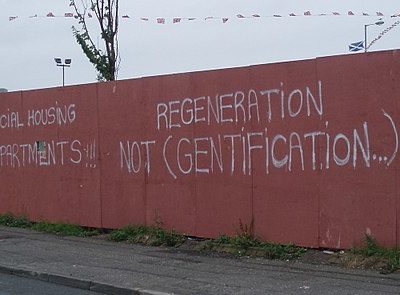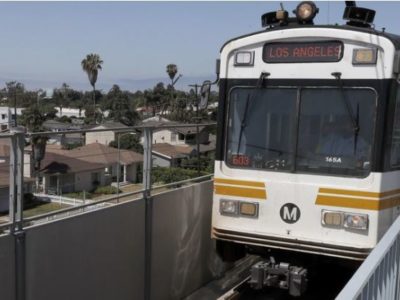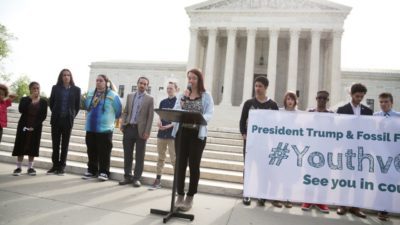Transportation
What I Wish The Green New Deal Hadn’t Left Out
Greening our infrastructure is part of the solution, but so’s city planning.
While there’s certainly been no shortage of criticism of last week’s Green New Deal resolution, the common line hasn’t been that the resolution doesn’t try to cover enough ground. On the contrary, it’s been called an everything-but-the-carbon-sink approach; even Trevor Noah devoted a few minutes of the Daily Show to gaping at the proposal’s efforts …
Continue reading “What I Wish The Green New Deal Hadn’t Left Out”
CONTINUE READINGGovernor Newsom Retreats On High Speed Rail
Revised Merced-Bakersfield vision in “State of the State” speech indicates reluctance to spend political capital
Governor Newsom’s “State of the State” speech today offered an abrupt scaling back of the state’s vision for its signature infrastructure project, high speed rail from Los Angeles to San Francisco: [L]et’s level about high speed rail. I have nothing but respect for Governor Brown’s and Governor Schwarzenegger’s ambitious vision. I share it. And there’s …
Continue reading “Governor Newsom Retreats On High Speed Rail”
CONTINUE READINGEmmett Institute Publishes Issue Brief on California’s Clean Air Act Vehicle Authority
Co-Authored by Ann Carlson, Meredith Hankins, and Julia Stein
Cross-posted to the American Constitution Society’s ACSblog As we have previously covered in past Legal Planet posts, in an outright assault on public health and the environment, the Trump Administration recently proposed rolling back national motor vehicle emission standards put in place by the Obama Administration. As part of this proposal, the Trump Administration also …
CONTINUE READINGLA’s Trying to Build Transit-Oriented Affordable Housing
But could we make it easier?
My colleague Jonathan Zasloff rightly points out that one way to harness the benefits of upzoning to alleviate our housing crisis is to promote inclusionary requirements for transit-oriented development. Los Angeles has adopted just such a program through its Transit-Oriented Communities ordinance, which I’ve written about here. Per the City of Los Angeles’ initial assessment, …
Continue reading “LA’s Trying to Build Transit-Oriented Affordable Housing”
CONTINUE READINGAfter Trump
Suppose we get a pro-climate-action unified government. What then?
Someday, the stars will surely come into alignment and Congress will be able to pass climate legislation. A national cap-and-trade scheme or a carbon tax would be definite possibilities. But let’s suppose they aren’t politically feasible, maybe because of opposition from progressive on equity grounds, or maybe because for some reason the public rejects them. …
Continue reading “After Trump”
CONTINUE READINGThe Worst of a Bad Lot
They’re all bad, but this regulatory rollback effort stands out for sheer incompetence.
The Trump Administration has many energy and environmental initiatives, none of them good. But in terms of shoddy analysis and tenuous evidence, the worst is the Administration’s attempt to freeze fuel efficiency standards. For sheer lack of professionalism, the Administration’s cost-benefit analysis is hard to match. And you can’t even say that the Administration is …
Continue reading “The Worst of a Bad Lot”
CONTINUE READINGWhat’s Wrong with Juliana (and What’s Right?)
The odds against the “children’s case” are bad and getting worse. But there’s a valid insight at its core.
Juliana v. United States, often called the “children’s case,” is an imaginative effort to make the federal government responsible for its role in promoting the production and use of fossil fuels and its failure to control carbon emissions. They ask the court to “declare the United States’ current environmental policy infringes their fundamental rights, direct the …
Continue reading “What’s Wrong with Juliana (and What’s Right?)”
CONTINUE READINGUsing Emergency Powers to Fight Climate Change
If Trump can stretch emergency powers, maybe they can be used for other purposes too.
Could a future President invoke emergency powers against climate change? Republicans are apparently worried that if Trump could use emergency powers by declaring border security a national emergency, the next president could do the same thing for climate change. There’s no doubt that this would be far more legitimate than Trump’s wall effort. Border crossings …
Continue reading “Using Emergency Powers to Fight Climate Change”
CONTINUE READINGGuest Blogger Gregory Dotson: Oregon May Join the Western Climate Initiative: What About Gasoline Prices?
Regardless of State Action, Surging Sales of Electric Vehicles Could Crash Gasoline Prices
Oregon is on the verge of taking historic action to establish an economy-wide cap and invest program and clean up the state’s carbon pollution. In doing so, Oregon could demonstrate how one state can do its part to avoid the worst effects of climate change. The concept dates back more than a decade, but the …
CONTINUE READINGNew CEQA SB 743 Transportation Guidelines Finally Finalized
Critical revisions will be discussed at March 1st Conference in Los Angeles — register now!
It took five years, but California has finally ditched an outdated and counter-productive metric for evaluating transportation impacts under the California Environmental Quality Act (CEQA). With the guidelines finalized on December 28th, a mere half-decade since the passage of SB 743 (Steinberg) in 2013, the state will ditch “auto delay” as a measure of project …
Continue reading “New CEQA SB 743 Transportation Guidelines Finally Finalized”
CONTINUE READING












